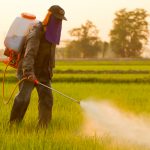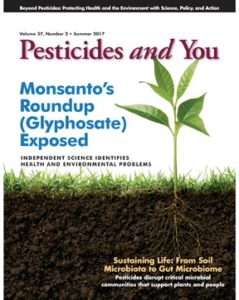
(
NaturalHealth365) Rates of chronic disease have skyrocketed in the United States in the past few decades – with the Centers for Disease Control and Prevention (CDC) reporting that conditions such as heart disease, cancer, type 2 diabetes and obesity are now among the most common health problems.
Independent researchers and natural health experts warn that glyphosate – used in the weed killer Roundup – is one of the culprits contributing to surging rates of these “21st century diseases.”
To learn more about the ways in which glyphosate exposure could be harming your health, keep reading.
Increasing rates of chronic diseases correspond closely to rising rates of glyphosate use nationwide
Glyphosate, a broad-spectrum, non-selective, systemic herbicide, is widely used on food crops, as well as on residential lawns, gardens and public parks. According to Beyond Pesticides, a nonprofit organization working to protect the public health, the United States uses 300 million pounds of glyphosate in agriculture – and almost as much for roadsides, waterways and other land areas.
Although
Roundup’s manufacturer, Monsanto, insists the product is ‘
safe,’ studies have found associations between glyphosate and cancer. In fact, the International Agency for Research on Cancer has classified glyphosate as a “probable carcinogen.”
In a review of research published by Beyond Pesticides, author Terry Shistar, Ph.D., noted that glyphosate and its formulated products cause endocrine disruption, damage DNA and adversely affect fetal development.
In addition, emerging research shows that glyphosate can destroy beneficial bacteria in the digestive tract,
contributing to a growing list of modern-day “plagues” that include diabetes, obesity, food allergies, autoimmune disease, autism, heart disease, cancer, asthma, irritable bowel disease, Celiac disease – plus many other devastating health conditions related to the digestive tract and immune system.
How does glyphosate disrupt microbial balance?
The community of bacteria contained in the intestinal tract – known as the gut microbiome – contains different species of beneficial bacteria that play an indispensable role in human health. Among other functions, these “friendly” bacteria help to absorb nutrients, produce fatty acids and vitamins, synthesize amino acids, neutralize toxins, boost immunity and prevent infection.
Glyphosate blocks a vital enzyme in the shikimate pathway, a system found in plants. This pathway does not occur in humans or animals, but it does exist in bacteria – meaning it can affect their survival and, consequently, human health.
(If the destruction of bacteria sounds like a trivial matter, remember: bacteria are so numerous that they constitute an astounding 90 percent of the cells in the human body. Life would not be possible without them.)
Glyphosate causes dybiosis – and encourages the growth of various pathogens
At the same time, beneficial bacteria such as Bifidobacterium and Lactobacillus (which would otherwise help to keep pathogens under control) can be highly susceptible to glyphosate. As a result, microbial balance can veer out of balance – a condition known as “dysbiosis” – promoting the survival of dangerous microbes and triggering a host of inflammatory diseases.
Researchers say that celiac disease, for example, is associated with the presence of pathogenic bacteria such as staphylococcus, salmonella and shigella. Ironically, glyphosate may actually help these microbes to thrive.
Natural health advocates spearhead a growing outcry against toxic glyphosate
Naturally, Monsanto continues to publicly insist that glyphosate is a harmless substance with no potential to cause cancer. Falling in line behind the “most hated corporation in America,” the Environmental Protection Agency (EPA) maintains that glyphosate is “not likely to cause cancer” – despite scientific evidence to the contrary.
But, people are calling Monsanto to task for their lies.
In a lawsuit filed by jointly by Beyond Pesticide and Organic Consumers Association, the plaintiffs assert that Monsanto falsely claims that Roundup targets an enzyme “not found in people or pets.” (The enzyme is, in fact, found in the gut bacteria of people and animals, causing glyphosate to disrupt the health and functioning of the microbiome and immune system).
The International Monsanto Tribunal has concluded that Monsanto has engaged in practices that negatively affect the right to a healthy environment, food and health – in other words, committed the crime of “ecocide.”
And, a collation of well-respected scientists and researchers has presented a consensus “Statement of Concern,” maintaining that evidence of glyphosate harm has mounted over the past few decades.
You can protect your microbial health by reducing glyphosate exposure wherever possible, avoiding indiscriminate use of antibiotics, and getting proper nutrition. According to David R. Montgomery, Ph.D. – expert on micribiome health and author of “Growing a Revolution,” – an organic diet rich in whole plant foods, unprocessed whole grains and fiber is your best bet for protecting and nourishing your indispensable microbiome.
Sources for this article include:
15
Aug

(
Beyond Pesticides, August 15, 2017) With increasing scientific understanding about the importance of beneficial bacteria in soil and the human body —microbiota in the soil and microbiome in the human gut, the summer 2017 issue of Beyond Pesticides’ journal,
Pesticides and You, publishes two critical articles to advance the importance of community discussion and action on organic and sustainable practices. The lead article,
Sustaining Life: From Soil Microbiota to Gut Microbiome by professor of geomorphology (University of Washington) and author David Montgomery, PhD, contains excerpts from Dr. Montgomery’s talk to Beyond Pesticides’ 35
th National Pesticide Forum, documenting the importance of soil microbiota to healthy soil, resilient plants, and sustainability. His piece explains the essentiality of bacteria in the human gut to a healthy life, with profound implications for both agriculture and medicine. Dr. Montgomery points to a “bonafide scientific revolution” in recognizing the failure to nurture the ecosystem in nature and the human body and the associated adverse health effects resulting from pesticide use –21
st century diseases, including asthma, autism, bacterial vaginosis, cardiovascular disease, cancer, Crohn’s disease, depression, inflammatory bowel disease, leaky gut syndrome, multiple sclerosis, obesity, Type 1 and 2 diabetes, and Parkinson’s.
Also in the Journal,
Monsanto’s Roundup (Glyphosate) Exposed, by Terry Shistar, Ph.D., documents the science linking the most widely used herbicide on the planet, Monsanto’s glyphosate, to the blocking of an enzyme that supports the essential pathway for beneficial bacteria, critical to human health. With scientific awareness of the importance of bacteria to plants and animals and the understanding of pesticides’ deleterious effect on them, eliminating toxic pesticide use becomes a central issue in the quest to protect public health. Given what is known about the delicate balance of soil microbiota and gut microbiome, Roundup’s antibiotic properties raise new concerns about the effects of glyphosate residues in food and water and the importance of shifting to organic practices. Glyphosate was classified as a probable human carcinogen in 2015 by the World Health Organization’s International Agency for Research on Cancer.
View talks on Beyond Pesticides’ YouTube channel. Dr. Montgomery and the complete series of talks and workshops from the 35th National pesticide Forum,
Healthy Hives, Healthy Lives, Healthy Land, are now available. Other speakers include: Don Huber, PhD, professor emeritus of plant pathology at Purdue University and expert on soil biology and glyphosate effects;;Vera Krischick, PhD, associate professor, Department of Entomology, University of Minnesota and researcher on pesticides and pollinators; and other speakers on science, policy, organic land management, and advocacy.
See updated factsheets. Beyond Pesticides also releases today newly updated factsheets on both
glyphosate and
lawn and garden pesticides, in light of their widespread intersection with public exposure and adverse effects.
Post Views: 7,237
This is a 28 page PDF archive of related articles which I won't reprint here, but it's certainly worth reading them.
DS

 (NaturalHealth365) Rates of chronic disease have skyrocketed in the United States in the past few decades – with the Centers for Disease Control and Prevention (CDC) reporting that conditions such as heart disease, cancer, type 2 diabetes and obesity are now among the most common health problems. Independent researchers and natural health experts warn that glyphosate – used in the weed killer Roundup – is one of the culprits contributing to surging rates of these “21st century diseases.”
(NaturalHealth365) Rates of chronic disease have skyrocketed in the United States in the past few decades – with the Centers for Disease Control and Prevention (CDC) reporting that conditions such as heart disease, cancer, type 2 diabetes and obesity are now among the most common health problems. Independent researchers and natural health experts warn that glyphosate – used in the weed killer Roundup – is one of the culprits contributing to surging rates of these “21st century diseases.” (Beyond Pesticides, August 15, 2017) With increasing scientific understanding about the importance of beneficial bacteria in soil and the human body —microbiota in the soil and microbiome in the human gut, the summer 2017 issue of Beyond Pesticides’ journal, Pesticides and You, publishes two critical articles to advance the importance of community discussion and action on organic and sustainable practices. The lead article, Sustaining Life: From Soil Microbiota to Gut Microbiome by professor of geomorphology (University of Washington) and author David Montgomery, PhD, contains excerpts from Dr. Montgomery’s talk to Beyond Pesticides’ 35th National Pesticide Forum, documenting the importance of soil microbiota to healthy soil, resilient plants, and sustainability. His piece explains the essentiality of bacteria in the human gut to a healthy life, with profound implications for both agriculture and medicine. Dr. Montgomery points to a “bonafide scientific revolution” in recognizing the failure to nurture the ecosystem in nature and the human body and the associated adverse health effects resulting from pesticide use –21st century diseases, including asthma, autism, bacterial vaginosis, cardiovascular disease, cancer, Crohn’s disease, depression, inflammatory bowel disease, leaky gut syndrome, multiple sclerosis, obesity, Type 1 and 2 diabetes, and Parkinson’s.
(Beyond Pesticides, August 15, 2017) With increasing scientific understanding about the importance of beneficial bacteria in soil and the human body —microbiota in the soil and microbiome in the human gut, the summer 2017 issue of Beyond Pesticides’ journal, Pesticides and You, publishes two critical articles to advance the importance of community discussion and action on organic and sustainable practices. The lead article, Sustaining Life: From Soil Microbiota to Gut Microbiome by professor of geomorphology (University of Washington) and author David Montgomery, PhD, contains excerpts from Dr. Montgomery’s talk to Beyond Pesticides’ 35th National Pesticide Forum, documenting the importance of soil microbiota to healthy soil, resilient plants, and sustainability. His piece explains the essentiality of bacteria in the human gut to a healthy life, with profound implications for both agriculture and medicine. Dr. Montgomery points to a “bonafide scientific revolution” in recognizing the failure to nurture the ecosystem in nature and the human body and the associated adverse health effects resulting from pesticide use –21st century diseases, including asthma, autism, bacterial vaginosis, cardiovascular disease, cancer, Crohn’s disease, depression, inflammatory bowel disease, leaky gut syndrome, multiple sclerosis, obesity, Type 1 and 2 diabetes, and Parkinson’s.









No comments:
Post a Comment